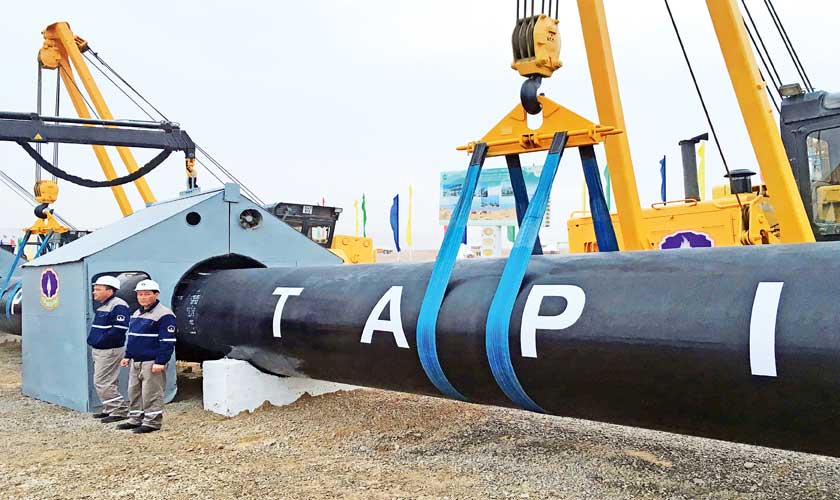Pipeline politics
After nearly two decades of dithering and delays, Pakistan, Turkmenistan, Afghani- stan and India last month took a giant step towards turning the much-talked about TAPI gas pipeline into a reality.
FOCUS
After nearly two decades of dithering and delays, Pakistan, Turkmenistan, Afghani- stan and India last month took a giant step towards turning the much-talked about TAPI gas pipeline into a reality.
The leaders from the four nations gathered at the Turkmenistan small town of Serhetabat to inaugurate the Turkmen section of the 1,840 kilometre pipeline that would pump 33 billion cubic metres of natural gas annually from Central Asia’s giant Galkynysh gas field to Afghanistan and Pakistan and then ultimately to India.
The presidents of Afghanistan and Turkmenistan along with Pakistani Prime Minister Shahid Khaqan Abbasi and Indian minister of state for external affairs then flew to the Afghan town of Herat for the ground-breaking ceremony of the Afghan section of the gigantic project that is estimated to cost 8 billion dollars.
Volatile security situation in the war-ravaged Afghanistan was one of the reasons for the long delay in the laying of the pipeline. Hours after the Serhetabat ceremony, Taliban spokesman Zabihullah Mujahid told international media outlets that the project was actively discussed during the Taliban rule in Afghanistan that ended in 2001, and Taliban would guarantee security for the pipeline as it is important for the development of their country.
The prospects for peace in Afghanistan as well as for the TAPI pipeline have further brightened after recent peace overtures by the Afghan President Ashraf Ghani and the Taliban leadership. Ghani has offered to recognise Taliban as a legitimate political group if it sits across the table, while Taliban too, a few weeks ago, offered unconditional talks to the United States.
The progress on TAPI, which is vital to meet the growing needs of Pakistan as well as well as other member countries, is commendable but the news coming from another equally important project, Iran-Pakistan gas pipeline, is very alarming.
Iran is said to be preparing to petition the Hague-based International Court of Arbitration to impose penalty on Pakistan for failing to implement the project.
Iran is reported to be demanding payment of over $1.2 billion in compensation as under the deal it is liable to pay one million dollar per day penalty from January 1, 2015 for failing to take up the gas from Iran.
Iran has completed the pipeline on its side of the border and is waiting for Pakistan to lay the pipeline on its side of the border. The TAPI and IP gas pipelines are crucial for the economic uplift of the energy-starved west and south Asian regions but regional conflicts, inter-state and geopolitical rivalries have unduly delayed the execution of these important projects.
While hostility between Pakistan and India, along with insecurity in Afghanistan, have hindered progress on TAPI, rivalry between Iran and its regional foe, Saudi Arabia, as well as hostilities between Tehran and Washington have stymied progress on IP.
Ironically, the two projects have of late also been projected as rival pipelines.
The United States and Saudi Arabia persistently oppose the IP project and have been pressing Pakistan and other states to expedite work on TAPI projects. Recent reports from central Asia suggest that Saudi Arabia plans to make huge investment into TAPI in an apparent attempt to dissuade Pakistan from the IP option.
It puts Pakistan in a very difficult position as it wants to maintain its deep-rooted ties with Saudi Arabia and at the same time wants to keep friendly relations with its western neighbour Iran.
“We are facing a double jeopardy. On the one hand we desperately want this project (IP) to meet our energy requirements but at the same time we do not want to disturb ties with Saudi Arabia,” former secretary for petroleum and natural resources Dr Gulfaraz Ahmed said.
He believed that Pakistan could not “properly share” its concerns with Iran prompting Iran to consider invoking penalty clause of Gas Sales Purchase Agreement because of undue delay in the implementation of the deal.
Industry experts, however, maintain Pakistan should immediately reach out to Iran to dissuade it from taking the drastic action and assure it that Islamabad is committed to the deal.
“Our experience of fighting such cases in the international courts is not very encouraging. We have always lost cases in the international courts,” Arshad Abbasi, an energy expert at Sustainable Development Policy Institute (SDPI) said referring to the outcome of the results of international arbitration on Reko Deq, rental power plants, Kishanganga and Baglihar dams etc.
Moreover, the experts say too much litigation, either in the domestic or the international courts on international commitments hurts the reputation of the country as a safe destination for private investment, and discourages businessmen and investors, particularly foreigners, to put their capital in that country.
One of the reasons for low foreign investment in Pakistan was the failure to fulfil its international commitments which ultimately resulted in litigation in the international courts by the parties concerned.
Chief Justice Saqib Nisar last month very rightly dismissed a petition filed by opposition politician Sheikh Rashid Ahmed seeking disqualification of Prime Minister Shahid Khaqan Abbasi as well as cancellation of the LNG deal with Qatar.
During his remarks, the chief justice told the petitioner’s lawyer that he should be mindful of the losses the country has incurred because of arbitration on international commitments.
Analysts say while dealing with issues like TAPI and IP, the Pakistani authorities need to keep the national interests supreme and plead their cases in an effective manner with the concerned countries.
“We should do what is best for the country,” Arshad Abbasi said.
He said Pakistan could re-negotiate gas price with Iran, as Tehran has previously shown willingness to do so, but maintained that the IP pipeline is very important for the energy security of the country. “Energy security means reliable, consistent supply of energy at affordable prices and the IP is one the options for Pakistan to ensure this security,” he added.
After Financial Action Task Force (FATF) debacle in Paris, which resulted in Pakistan getting placed on the ‘grey list’ of terror financing countries in June, the government needs to speed up its efforts to avoid more embarrassment for the country.
Pakistan’s relations with Iran had already been under strain in the past and have recently shown improvement because of robust efforts of the leaders from both countries. These efforts should be continued to avoid another low in the relations.
The writer is a senior journalist based in Islamabad













